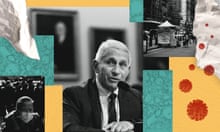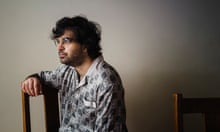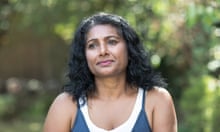Many are still reporting minimization of their long Covid symptoms – and it’s partially attributable to the fact that female patients are routinely dismissed.
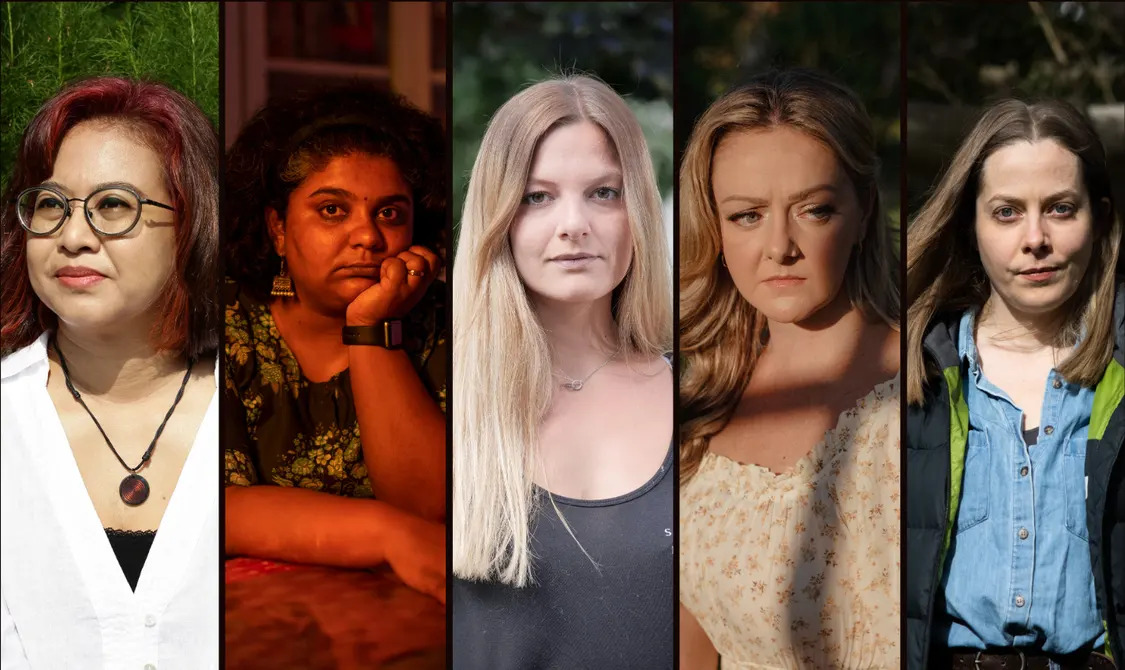 Left to Right: Pitra Moeis, Varalakshmi Padma Priya Dharmavarapu, Georgia Lancaster, Beth Ann Pardo, Alice Rumble. Photograph: Febri Sugita, Harsha Vadlamani, Mark Pinder, Chloë Ellingson, Blake Sharp-Wiggins/The Guardian
Left to Right: Pitra Moeis, Varalakshmi Padma Priya Dharmavarapu, Georgia Lancaster, Beth Ann Pardo, Alice Rumble. Photograph: Febri Sugita, Harsha Vadlamani, Mark Pinder, Chloë Ellingson, Blake Sharp-Wiggins/The Guardian
–Read the Guardian’s new series, Living with long Covid
In June, Dr Massimo Galli, a well-known infectious diseases specialist in Italy, disclosed that since contracting Covid in January, he had experienced widespread muscle pain and “a fair amount of fatigue that I did not have before”.
The interview, headlined My Long Battle With Long Covid, contained a mea culpa: Galli confessed that he had initially doubted the condition. “With due embarrassment,” he admitted to having believed many long Covid symptoms – including brain fog and cardiovascular issues – to be psychosomatic phenomena. “Now that I’m myself affected, I have to reconsider some of my beliefs,” Galli said.
One of Italy’s best-known Covid experts had, in other words, failed to give credence to the experiences of long Covid patients until he himself became one.
Despite the condition gaining official recognition by the World Health Organization last October, many are still reporting wide-ranging skepticism and the minimization of their symptoms. This disregard, according to the epidemiologists Dr Stephen Phillips and Harvard’s Prof Michelle Williams, is partially attributable to the fact that it has disproportionately affected women.
“Our medical system has a long history of minimizing women’s symptoms and dismissing or misdiagnosing their conditions as psychological,” they wrote in the New England Journal of Medicine last year. “Women of color with long Covid, in particular, have been disbelieved and denied tests that their white counterparts have received.”
(Race and wealth play a role too; in the US, doctors are now pointing out that Black and Latino men, who were the hardest hit by Covid, may be underrepresented in long Covid research and have significant barriers to access care.)
Medical misogyny doesn’t come as a surprise to the many patients who have been disbelieved in the past. Medicine has long treated women as second-class citizens. The field’s historical male dominance has had lasting impacts: bias in clinical trials has led to poorer treatment and outcomes for women, and delayed diagnosis in women for diseases that have only been studied in men. Gaps in knowledge about conditions that affect women, such as endometriosis, have given rise to the dismissal of symptoms and narratives about hysteria.
The long-term impacts of Covid-19 have familiar parallels. Long Covid has overlapping symptoms with myalgic encephalomyelitis/chronic fatigue syndrome (ME/CFS), a complex and often debilitating illness that can follow viral infections. The CDC estimates women are diagnosed with ME/CFS at three to four times the rate of men. Distrust or suspicion from doctors when they report symptoms is commonplace.
“Long Covid is new, but in a way it’s not,” says Dr Ziyad Al-Aly, a long Covid researcher and chief of research and development at the Veterans Affairs Saint Louis Health Care System in the US. Chronic post-viral illness is known to have followed outbreaks of many viruses, including polio, Ebola, Sars, Mers, dengue and the 2009 influenza pandemic – all with common symptoms including fatigue and neurological disturbances. Chronic post-viral conditions, research shows, affect more women than men.
Al-Aly says medical professionals are notoriously poor at dealing with uncertainty: “When faced with a new complex disease and a lot of unknowns, their default is to psychologize it, gaslight it, attribute it to something else. Instead of acknowledging the limitations of our knowledge, we default to explanations that put the burden or the blame on the patient.”
For those with post-viral illnesses that have long been overlooked, this is all too familiar, as the following stories from women around the world show.
Alice Rumble, New South Wales, Australia
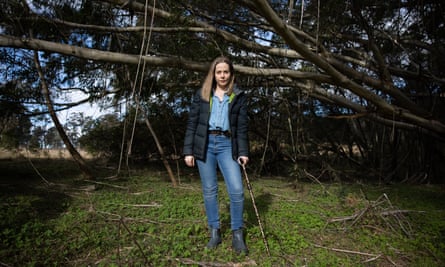
–
“I have the most textbook case of ME possible … glandular fever when you’re 18 and then not getting better,” says Rumble, who lives in the Southern Highlands of New South Wales, in southeastern Australia.
When she asked doctors about the possibility of ME/CFS – which would explain her extreme fatigue, inability to walk properly and cognitive difficulties – she was met with resistance and told it was a condition experts didn’t know much about.
It took eight years for Rumble, then a lawyer, to receive an official diagnosis. “Probably the most frustrating thing in that whole period was that there was no one who was willing to call it what it was,” she says. She was told repeatedly: “You’ll get better. You’re young, you’re healthy, you’re positive – you’ll be fine.”
“I think what they meant was that I was thin and I wasn’t mentally ill – that came up constantly,” Rumble says. She knows other patients who experienced discrimination on the basis of their weight or mental health, out of a misguided belief that “there is no explanation for this, so it must be your mindset”.
The language historically used to describe the illness – in the 1980s, ME/CFS was called a disease of “depressed menopausal women” and widely referred to in the media as “yuppie flu” – shows how it has been disregarded because it mostly affects women, she says.
Several male doctors attributed Rumble’s symptoms to the stress of her profession. “I know a lot of women who work as lawyers, and their bodies also work,” she says wryly. “Continually not affirming that it was ME made me not take it seriously, made me think: ‘Oh, I’ll just push through and I’ll get better.’
“When I got diagnosed – that’s when support came, that’s when acceptance came. That’s when I tried to make my life better, when I forgave myself for not fixing my neurological disease with my attitude.”
Now in her 30s, Rumble has accepted the possibility that she may never recover. “It’s not a failure of imagination … it’s been a really long time, I’ve tried absolutely everything I can, so now I’m just going to try to live happily with really limited capacity. That shift was really positive for me. You can live a happy peaceful life [with ME/CFS], but we’ve been treated terribly and we need funding for research.”
Varalakshmi Padma Priya Dharmavarapu, Hyderabad, India
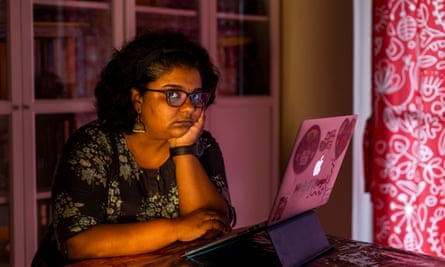
–
Varalakshmi Padma Priya Dharmavarapu experienced her first long Covid crash in July 2020, three months after being infected.
Dharmavarapu, a media entrepreneur, was returning from the shops when she collapsed in her apartment complex. “I felt my heart rate go up, I started sweating profusely and I blacked out,” she recalls.
Tachycardia – an elevated heart rate – was a persistent issue, and she was hospitalized several times as a result. “One medical student asked me if I was faking my symptoms to get attention from my husband. I was like, are you fucking kidding?’”
When initial tests ordered by a cardiologist came back as normal, the specialist suggested her symptoms might have been the result of a “stressful family life”.
“You have a young kid at home, you’ve been unwell,” Dharmavarapu recalls being told. The cardiologist was convinced she had severe anxiety – but instead of prescribing anxiolytic medications, she suggested she drink more water, wear compression socks and reduce stress levels at home. “That was the beginning of my medical gaslighting,” Dharmavarapu says.
In August 2020, at her own insistence, Dharmavarapu completed a Holter test which continuously monitors heart activity for a day. She was told by the technician that her heart rate showed abnormalities 163 times in a 24-hour span. The cardiologist called Dharmavarapu after receiving the test report. “She said, ‘Were you exercising when the Holter was being done?’” Dharmavarapu responded: “I’m telling you: I’m barely able to move … I am sitting watching Netflix and my heart rate goes up.”
A month and several doctors later, she was referred to an internal medicine specialist who discovered that her noradrenaline and adrenaline levels were abnormally high. “He was the first doctor who actually helped me out,” she says. “He tried to explain to me scientifically what was happening and didn’t talk down to me.”
Dharmavarapu’s symptoms seemed to stabilize for a few months, but worsened again in February 2021. She was eventually diagnosed with postural orthostatic tachycardia syndrome. In April 2021, she caught Covid a second time, and was hospitalized in intensive care for 10 days.
Dharmavarapu, who co-founded a podcast platform and formerly did advocacy work for Doctors Without Borders, was frustrated by a lack of peer support and started her own long Covid support group. “I feel like the awareness in India is negligible,” she says.
Dharmavarapu has now returned to work, but still has days when her symptoms are more severe, particularly when she is menstruating. It was a “huge trial and error” process of finding the right doctor, and frustrating “to be told ‘we understand’ and then just being invalidated”, she says. “On medical gaslighting as an issue, the misogyny part, I think, has been there for a really long time.”
Georgia Lancaster, Gateshead, UK
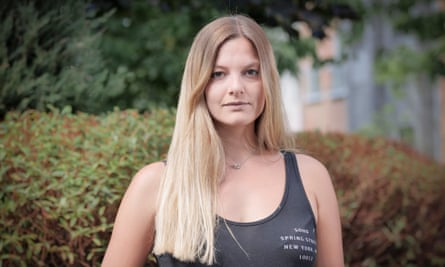
–
Georgia Lancaster, 26, developed ME/CFS symptoms just after Christmas 2020 after a viral illness. She was working as a carer at the time and frequently tested for Covid, always returning negative results.
Exhaustion came first, followed by severe neurological symptoms. “I couldn’t talk properly, I had bad coordination, I was walking into things,” she says. “I would end up in random places and have no idea what was going on … it was quite scary.” She was initially told it might be viral meningitis, and was later referred for a scan to rule out a brain tumor.
A neurologist asked whether she found it difficult to get up each morning. “It’s very challenging,” she recalls saying. “I can’t walk 100 meters without needing to sit down.” The doctor suggested that she was depressed. “He said … maybe I’m not happy with my life around me – when really, I’ve got a support network and I’m just trying to get in better health. The second I heard that, I lost faith in a lot of things.”
As a former acrobatic gymnast who won a world championship in 2014, Lancaster had always thought of herself as physically and mentally resilient. “I would always say my body was capable of so much more than my brain ever knew,” she says.
Lancaster’s interactions with medical professionals made her question her own symptoms, which often fluctuate (periods of remission and relapse are common in ME/CFS). Four months into her illness, Lancaster woke up one morning symptom-free. “I’m better, I can’t believe it!” she thought. “I told myself: ‘Maybe it is mental health’ … The next day, I was ill again.”
Eventually, Lancaster realized what she was feeling was real. She was eventually diagnosed with ME/CFS by a GP, but her interactions with the health system have left her wary. “I put off going to the doctors as much as I can,” she says. “When I was pushing for a diagnosis, I just wanted to know what was wrong with me so I could fix it. But then you get the title of ME, and it’s like, oh, there is no fix.”
Lancaster hopes the attention paid to long Covid will have a positive effect on ME/CFS awareness. “I’ve noticed online that people with ME are supporting people with long Covid,” she says. “There are so many people who’ve been ignored and belittled for so many years.”
Beth Ann Pardo, Ontario, Canada
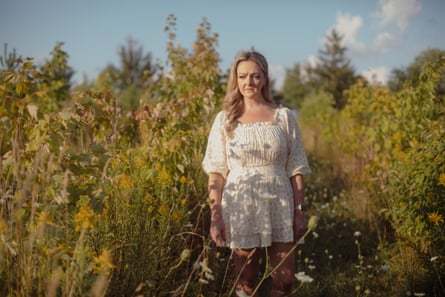
–
Beth Ann Pardo was a dedicated runner and hiker before getting Covid in 2020. She had completed her 13th marathon just six months earlier.
Her infection left her bed-bound for 17 days, with many of the hallmarks of Covid: fatigue, shortness of breath, fever, cough. But her symptoms lingered for months.
Some, such as shortness of breath and chest pain, have improved over time. “Brain fog used to be a persistent thing, but now it’s only when I’m depleted, in a [post-exertional] crash,” Pardo says. “What’s gotten worse is my pain. From day one, for some reason Covid attacked my legs … every day I wake up and feel like I ran a marathon that I didn’t train for the day before.”
Pardo is a participant in Canada’s CanCov study, which tracks long-term outcomes in Covid-19 patients. She was lucky that her doctor believed her right away, and was quickly diagnosed with long Covid. She was given an ME/CFS diagnosis as she has met all the diagnostic criteria for quite some time. (New research is uncovering cellular commonalities between people who have ME/CFS and long Covid.)
“While my story has been generally positive, I didn’t see a doctor for nine months [after her initial infection] because I was terrified of not being believed.”
She has encountered some specialists who “just don’t know what to do with long-haulers. They give you a … ‘You’re healthier than me on paper. You’ve just gotta keep plugging on!’ and brush you off.”
The early months were particularly difficult. “Every time I would see a runner on the side of the road, I felt like I had been kicked in the stomach because I miss it so much.” Recently, Pardo has been searching for alternatives to the activities she used to enjoy. “I’ve been looking for electric scooters to ride around, because I miss my country roads.”
Pardo started a TikTok account to document her condition and advocate for people with long Covid. “The first thing I always tell people is: you might not be sick forever.” Pardo has seen some TikTokers with long Covid recover after a year or 18 months. “I’m not one of those people, but I’m really excited for them, obviously.”
Pitra Moeis, Bandung, Indonesia
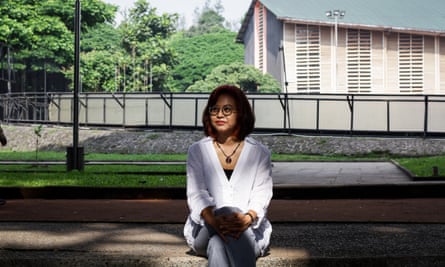
–
“When I wake up in the morning, I feel like all my body has been beaten by 20 people,” says Pitra Moeis. “It takes an hour or two for me to get up from the bed.”
Moeis, who lives in Bandung, Indonesia, caught Covid in June 2021, and developed long Covid symptoms, including pain and fatigue, in the months following her infection. She was previously active, training for two hours at the gym three times a week. “Now, even 10 minutes of cardio training is a big thing for me … my heart rate becomes very high and I get short of breath.”
A single mother of two daughters, Moeis works for an environmental NGO and is concurrently studying for a master’s in public health. “After Covid, the days are not the same any more. I really get exhausted easily,” she says. (Post-exertional malaise – in which symptoms worsen after physical or cognitive exertion – is a hallmark of ME/CFS and long Covid.)
Brain fog has been a persistent problem. “My work involves a lot of writing and analysis – for me it’s really, really frustrating,” she says. “I love books and I love writing, so it feels like I’m really losing myself right now … it takes a lot of effort just to read a paragraph.”
Moeis has faced skepticism from teachers in her public health master’s, most of whom are doctors. “I said that I really couldn’t focus to write an essay for your class – they just couldn’t get it,” she says. Some have accused her of not prioritizing her assessments, or told her she should focus harder.
The most common response when she tells others she has long Covid, Moeis says, is that she is just getting older. “I’m 40 now, but I don’t think getting older is [supposed to be] this miserable,” she says.
Moeis is a member of the group Covid Survivor Indonesia, which advocates for people living with long Covid and now has tens of thousands of followers on social media.
“In Indonesia, the ministry of health hasn’t produced any guidance or protocol to treat long Covid,” Moeis says. “Maybe the doctors are still confused about what to do – it’s confusing for everyone.”
–












